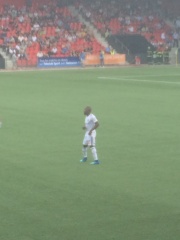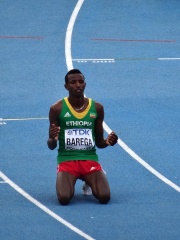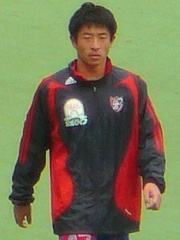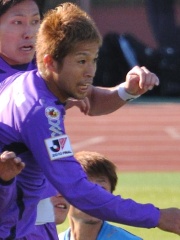Soccer Player
Terumi Nagae
2000 - today
EN.WIKIPEDIA PAGE VIEWS (PV)

 Terumi Nagae
Terumi Nagae
Her biography is available in 37 different languages on Wikipedia (up from 36 in 2024). Terumi Nagae is the 13,992nd most popular soccer player (up from 15,477th in 2024), the 3,834th most popular biography from Japan (down from 3,377th in 2019) and the 1,754th most popular Japanese Soccer Player.
Memorability Metrics
Page views of Terumi Nagae by language
Among Soccer Players
Among soccer players, Terumi Nagae ranks 13,992 out of 21,273. Before her are Nicola Leali, Aldo Kalulu, Mitchell Donald, Kevin Nolan, Wilfried Gnonto, and Roman Adamov. After her are Tatsuya Murata, Marcel Tisserand, Juan Ángel Albín, Sabien Lilaj, Ivica Ivušić, and Álvaro Medrán.
Most Popular Soccer Players in Wikipedia
Go to all RankingsNicola Leali
1993 - Present
HPI: 40.56
Rank: 13,999
Aldo Kalulu
1996 - Present
HPI: 40.55
Rank: 14,000
Mitchell Donald
1988 - Present
HPI: 40.55
Rank: 14,001
Kevin Nolan
1982 - Present
HPI: 40.55
Rank: 14,002
Wilfried Gnonto
2003 - Present
HPI: 40.55
Rank: 14,003
Roman Adamov
1982 - Present
HPI: 40.55
Rank: 14,004
Terumi Nagae
2000 - Present
HPI: 40.55
Rank: 14,005
Tatsuya Murata
1972 - Present
HPI: 40.55
Rank: 14,006
Marcel Tisserand
1993 - Present
HPI: 40.55
Rank: 14,007
Juan Ángel Albín
1986 - Present
HPI: 40.55
Rank: 14,008
Sabien Lilaj
1989 - Present
HPI: 40.55
Rank: 14,009
Ivica Ivušić
1995 - Present
HPI: 40.55
Rank: 14,010
Álvaro Medrán
1994 - Present
HPI: 40.55
Rank: 14,011
Contemporaries
Among people born in 2000, Terumi Nagae ranks 220. Before her are Angel Gomes, Abner Vinícius, Selemon Barega, Benee, Tali Golergant, and Jack Clarke. After her are Eliot Vassamillet, Mohamed Amoura, Thijs Dallinga, Jesús Ferreira, Raoul Bellanova, and Firas Al-Buraikan.
Others Born in 2000
Go to all RankingsAngel Gomes
SOCCER PLAYER
2000 - Present
HPI: 40.81
Rank: 214
Abner Vinícius
SOCCER PLAYER
2000 - Present
HPI: 40.79
Rank: 215
Selemon Barega
ATHLETE
2000 - Present
HPI: 40.75
Rank: 216
Benee
MUSICIAN
2000 - Present
HPI: 40.73
Rank: 217
Tali Golergant
SINGER
2000 - Present
HPI: 40.72
Rank: 218
Jack Clarke
SOCCER PLAYER
2000 - Present
HPI: 40.68
Rank: 219
Terumi Nagae
SOCCER PLAYER
2000 - Present
HPI: 40.55
Rank: 220
Eliot Vassamillet
SINGER
2000 - Present
HPI: 40.51
Rank: 221
Mohamed Amoura
SOCCER PLAYER
2000 - Present
HPI: 40.51
Rank: 222
Thijs Dallinga
SOCCER PLAYER
2000 - Present
HPI: 40.49
Rank: 223
Jesús Ferreira
SOCCER PLAYER
2000 - Present
HPI: 40.41
Rank: 224
Raoul Bellanova
SOCCER PLAYER
2000 - Present
HPI: 40.40
Rank: 225
Firas Al-Buraikan
SOCCER PLAYER
2000 - Present
HPI: 40.30
Rank: 226
In Japan
Among people born in Japan, Terumi Nagae ranks 3,841 out of NaN. Before her are Emi Takei (1993), Hitoshi Morishita (1972), Masatomo Kuba (1984), Kanata Hongō (1990), Minako Kotobuki (1991), and Ai Kawashima (1986). After her are Tatsuya Murata (1972), Keisuke Hada (1978), Rika Izumi (1988), Takashi Onishi (1971), Yoshifumi Ono (1978), and Koharu Kusumi (1992).
Others born in Japan
Go to all RankingsEmi Takei
ACTOR
1993 - Present
HPI: 40.58
Rank: 3,835
Hitoshi Morishita
SOCCER PLAYER
1972 - Present
HPI: 40.57
Rank: 3,836
Masatomo Kuba
SOCCER PLAYER
1984 - Present
HPI: 40.57
Rank: 3,837
Kanata Hongō
ACTOR
1990 - Present
HPI: 40.57
Rank: 3,838
Minako Kotobuki
ACTOR
1991 - Present
HPI: 40.56
Rank: 3,839
Ai Kawashima
SINGER
1986 - Present
HPI: 40.56
Rank: 3,840
Terumi Nagae
SOCCER PLAYER
2000 - Present
HPI: 40.55
Rank: 3,841
Tatsuya Murata
SOCCER PLAYER
1972 - Present
HPI: 40.55
Rank: 3,842
Keisuke Hada
SOCCER PLAYER
1978 - Present
HPI: 40.54
Rank: 3,843
Rika Izumi
ACTOR
1988 - Present
HPI: 40.53
Rank: 3,844
Takashi Onishi
SOCCER PLAYER
1971 - Present
HPI: 40.53
Rank: 3,845
Yoshifumi Ono
SOCCER PLAYER
1978 - Present
HPI: 40.51
Rank: 3,846
Koharu Kusumi
ACTOR
1992 - Present
HPI: 40.51
Rank: 3,847
Among Soccer Players In Japan
Among soccer players born in Japan, Terumi Nagae ranks 1,761. Before her are Toshiyuki Abe (1974), Ryuji Sueoka (1979), Yojiro Takahagi (1986), Jo Kanazawa (1976), Hitoshi Morishita (1972), and Masatomo Kuba (1984). After her are Tatsuya Murata (1972), Keisuke Hada (1978), Takashi Onishi (1971), Yoshifumi Ono (1978), Toshimi Kikuchi (1973), and Kōji Morisaki (1981).
Toshiyuki Abe
1974 - Present
HPI: 40.60
Rank: 1,755
Ryuji Sueoka
1979 - Present
HPI: 40.59
Rank: 1,756
Yojiro Takahagi
1986 - Present
HPI: 40.58
Rank: 1,757
Jo Kanazawa
1976 - Present
HPI: 40.58
Rank: 1,758
Hitoshi Morishita
1972 - Present
HPI: 40.57
Rank: 1,759
Masatomo Kuba
1984 - Present
HPI: 40.57
Rank: 1,760
Terumi Nagae
2000 - Present
HPI: 40.55
Rank: 1,761
Tatsuya Murata
1972 - Present
HPI: 40.55
Rank: 1,762
Keisuke Hada
1978 - Present
HPI: 40.54
Rank: 1,763
Takashi Onishi
1971 - Present
HPI: 40.53
Rank: 1,764
Yoshifumi Ono
1978 - Present
HPI: 40.51
Rank: 1,765
Toshimi Kikuchi
1973 - Present
HPI: 40.50
Rank: 1,766
Kōji Morisaki
1981 - Present
HPI: 40.50
Rank: 1,767









































